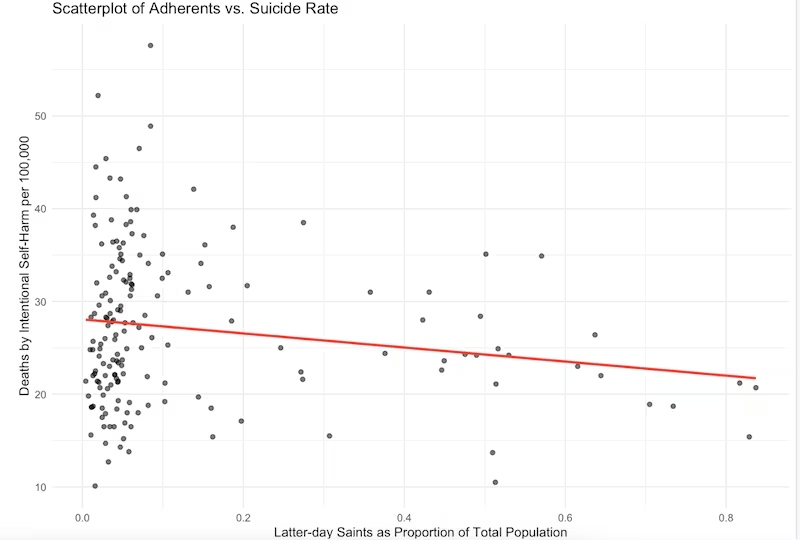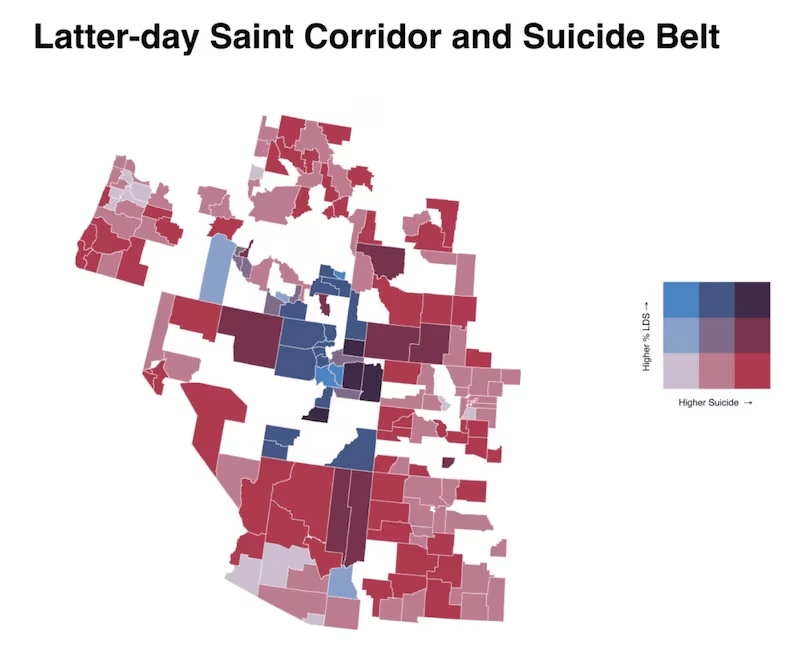Antidepressants in Utah

Do Utahns use more antidepressants than non-Utahns?
Yes. The most recent numbers—from 2019—showed Utah was ranked 16th in the nation for antidepressant use per capita.[1] However, earlier studies—from 2002 and 2008—ranked Utah as first in antidepressant usage per capita.[2]
Do members of the Church have a higher than normal use of antidepressants?
Possibly, but probably not. Geographic studies indicate that many areas with significant Latter-day Saint populations are less likely to use antidepressants.[3]
For example, Utah County has one of the highest Latter-day Saint populations in Utah,[4] but the Utah Department of Health reports that Provo—the largest city in Utah County—has the lowest antidepressant usage in Utah.[5] Idaho also has a large per capita Latter-day Saint population,[6] but it is below average for antidepressant usage.[7]
Are rates of depression in Utah higher than in other parts of the country?
Yes. The U.S. Department of Health and Human Services reported that in 2019–2020 Utah generally scored higher than any other state for adults on various metrics related to mental health.[8]
And in 2019 the Center for Disease Control reported that Utah had the 6th-highest suicide rate and Statista reported that Utah had the 16th-highest rate of antidepressant prescriptions in the U.S.[9]
Related Question
Is there any data about the happiness of Latter-day Saint marriages?
Read more in Latter-day Saint Marriage & Divorce Statistics
What are the reasons for higher depression rates in Utah than the rest of the country?
The research does not indicate a specific reason, but there is strong evidence that indicates that it has something to do with Utah's high elevation,[10] as many studies have connected depression and suicide rates with elevation.[11]
Does having more Latter-day Saints in an area increase suicide rates?
No. Based on data from the Center for Disease control and US Census data, high Latter-day Saint populations appear to have similar or lower rates of suicide when compared to neighboring counties in the Rocky Mountain area.[12]


How does Utah measure up in positive mental health metrics?
Utah tends to score high on various measures of happiness and life satisfaction.[15]
How come there is high depression but also high happiness and life satisfaction?
It's unclear. These paradoxical findings of high happiness rates combined with high suicide and depression rates are also found in other areas like some Scandinavian countries.[16] One possible theory is that the decision to commit suicide is driven by comparison effects, and people who are depressed could feel worse if they are in a happy context.[17]
Does the pressure to be “perfect” in the Latter-day Saint culture cause depression?
Possibly, but no studies have tested whether Latter-day Saint culture is connected to increased depression among Latter-day Saints.
Various studies have looked into the mental health of Latter-day Saints in Utah, but the results are mixed.[18] Studies that look at Church members worldwide tend to show that Church members are mentally healthier.[19]
Is there any truth to the idea that because Latter-day Saint people don't drink alcohol, coffee, or smoke, they simply replace these coping mechanisms with antidepressants?
Possibly, but no there is no research on this. Researchers have studied the phenomenon of "drinking to cope,"[20] but there is no data that indicates that decreased drinking leads to increased antidepressant usage.
Related Question
How is Utah different from other states for alcohol-drinkers?
Read more in Utah Alcohol Laws
Is there a Church policy on using antidepressants or seeking therapy?
Yes. The Church's General Handbook states that bishops are to help suicide attempt victims obtain professional help.[21] Recent publications in official Church magazines or talks in General Conference have recommended the use of needed psychiatric medication.[22]
- Nicholas
“I've always considered this to be an odd and poorly aged criticism of the church. What, is it a good thing to demonize mental health and good access to healthcare? Depression and Anxiety are universal in all cultures, but whether or not people have access to help is the key.” - Mikaela B.
“There's a history of mental illness in my family and I've grappled with it a lot. Part of getting along with it is understanding where depression comes from. I appreciate research about depression so I can focus on areas to improve, including in my relationship with the gospel.”



 about this topic
about this topic